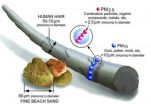(Press-News.org) Boston, MA – In the first comprehensive study to look at how anti-smoking laws are affecting the health of children, researchers from University of Edinburgh collaborated with researchers from Maastricht University, Hasselt University, Harvard Medical School and Brigham and Women's Hospital, to conduct a systematic review and meta-analysis examining the effect of smoke-free legislation on child health. They found that the introduction of new laws that ban smoking in public places in North America and Europe has been followed by a decrease in rates of premature births and hospital visits for asthma attacks in children. These findings are published on March 28, 2014 in The Lancet.
Researchers analyzed 11 studies conducted in North America and Europe that included more than 2.5 million births and approximately 250,000 asthma-related hospital visits. They report that while the impact of anti-smoking laws varies between countries, the overall impact on child health is very positive. Specifically, the data show that rates of both preterm birth and hospital admissions for asthma were reduced by 10 percent following the implementation of laws that prohibited smoking in public places.
"This research has demonstrated the very considerable potential that smoke-free legislation offers to reduce preterm births and childhood asthma attacks. The many countries that are yet to enforce smoke-free legislation should in the light of these findings reconsider their positions on this important health policy question," said Aziz Sheikh, senior author and a physician-researcher at Brigham and Women's Hospital, visiting professor of Medicine at Harvard Medical School and Professor of Primary Care Research and Development at The University of Edinburgh.
According to information in the article, 16 percent of the world's population is covered by smoke-free laws, while 40 percent of children worldwide are regularly exposed to second-hand smoke. Laws that prohibit smoking in public places, such as bars, restaurants and work places, are already proven to protect adults from the health threats associated with passive smoking, but research to date has not systematically evaluated the impact of smoking bans on children.
Passive smoking can cause babies to be stillborn or born prematurely and is linked to certain birth defects, asthma and lung infections. Studies have also suggested that being exposed to second hand smoke during childhood may have long term health implications, contributing to the development of chronic diseases like heart disease and diabetes in later life.
Lead researcher, Dr Jasper Been of the University of Edinburgh's Centre for Population Health Sciences said, "Our research shows that smoking bans are an effective way to protect the health of our children. These findings should help to accelerate the introduction of anti-smoking legislation in areas not currently protected."
INFORMATION:
Brigham and Women's Hospital (BWH) is a 793-bed nonprofit teaching affiliate of Harvard Medical School and a founding member of Partners HealthCare. BWH has more than 3.5 million annual patient visits, is the largest birthing center in New England and employs nearly 15,000 people. The Brigham's medical preeminence dates back to 1832, and today that rich history in clinical care is coupled with its national leadership in patient care, quality improvement and patient safety initiatives, and its dedication to research, innovation, community engagement and educating and training the next generation of health care professionals. Through investigation and discovery conducted at its Biomedical Research Institute (BRI), BWH is an international leader in basic, clinical and translational research on human diseases, more than 1,000 physician-investigators and renowned biomedical scientists and faculty supported by nearly $650 million in funding. For the last 25 years, BWH ranked second in research funding from the National Institutes of Health (NIH) among independent hospitals. BWH continually pushes the boundaries of medicine, including building on its legacy in transplantation by performing a partial face transplant in 2009 and the nation's first full face transplant in 2011. BWH is also home to major landmark epidemiologic population studies, including the Nurses' and Physicians' Health Studies and the Women's Health Initiative. For more information, resources and to follow us on social media, please visit BWH's online newsroom.
Public smoking bans associated with reduction in premature births and childhood asthma
Rates of both preterm birth and hospital admissions for asthma were reduced by 10 percent following the implementation of laws that prohibited smoking in public places
2014-03-28
ELSE PRESS RELEASES FROM THIS DATE:
Using tobacco to thwart infectious disease?
2014-03-27
An international research group led by Arizona State University professor Qiang "Shawn" Chen has developed a new generation of potentially safer and more cost-effective therapeutics against West Nile virus, and other pathogens.
The therapeutics, known as monoclonal antibodies (MAbs) and their derivatives, were shown to neutralize and protect mice against a lethal dose challenge of West Nile virus---even as late as 4 days after the initial infection.
"The overarching goal of our research is to create an innovative, yet sustainable and accessible, low cost solution to ...
How rotavirus infection accelerates autoimmune diabetes in a mouse model
2014-03-27
A combination of genetic predisposition and environmental factors is believed to cause autoimmune (type 1) diabetes. A study published on March 27th in PLOS Pathogens gets at the mechanisms by which rotavirus infection contributes to autoimmune diabetes in a mouse model of the disease.
NOD (for non-obese diabetic) mice are prone to develop diabetes, and infection with rotavirus accelerates onset of the disease. Barbara Coulson and colleagues, from The University of Melbourne, Australia, tested the hypothesis that the virus does this by inducing "bystander activation". ...
Genetic variation linked to heart disease risk through RNA machinery
2014-03-27
Researchers have pinpointed a new mechanism of how natural variation in our DNA alters an individual's risk for developing heart disease by interfering with the ability of a developmental gene to interact with a specialized type of RNA. This work expands on previous work identifying the "hidden" causes of complex disease risk, with the goal of unlocking new pathways and potential drug targets for cardiovascular disease.
This latest study led by Thomas Quertermous, MD at Stanford University and Georg Sczakiel, PhD at the University of Lübeck (Germany) was a joint effort ...
Ancient African cattle first domesticated in Middle East
2014-03-27
Geneticists and anthropologists previously suspected that ancient Africans domesticated cattle native to the African continent nearly 10,000 years ago. Now, a team of University of Missouri researchers has completed the genetic history of 134 cattle breeds from around the world. In the process of completing this history, they found that ancient domesticated African cattle originated in the "Fertile Crescent," a region that covered modern day Iraq, Jordan, Syria and Israel.
In their study published in PLOS Genetics, Prof. Decker (University of Missouri) and a team of international ...
Autoimmune drug may help prevent kidney disease caused by diabetes
2014-03-27
Washington, DC (March 27, 2014) — A drug currently used to treat autoimmune disease may also help prevent the kidney-damaging effects of diabetes, according to a study appearing in an upcoming issue of the Journal of the American Society of Nephrology (JASN). The findings suggest that clinical trials should be designed to test the drug in diabetic patients.
Kidney disease is one of the most serious complications of diabetes. Diabetics who develop kidney disease, or diabetic nephropathy, due to high blood glucose levels may eventually require dialysis or a kidney transplant. ...
Major depression linked with nearly twice the risk of kidney failure in diabetics
2014-03-27
Washington, DC (March 27, 2014) — Major depression may increase diabetes patients' risk of developing kidney failure, according to a study appearing in an upcoming issue of the Clinical Journal of the American Society of Nephrology (CJASN). Additional studies are needed to determine whether treatment for depression can improve kidney health in patients with diabetes.
Individuals with diabetes have a high prevalence of depressive symptoms, which has previously been linked with negative health outcomes such as cardiovascular disease and premature death. Little is known ...
Gulf War illness not in veterans' heads, but in their mitochondria
2014-03-27
Researchers at the UC San Diego School of Medicine have demonstrated for the first time that veterans of the 1990-91 Persian Gulf War who suffer from "Gulf War illness" have impaired function of mitochondria – the energy powerhouses of cells.
The findings, published in the March 27, 2014 issue of PLOS ONE, could help lead to new treatments benefitting affected individuals – and to new ways of protecting servicepersons (and civilians) from similar problems in the future, said principal investigator Beatrice A. Golomb MD, PhD, professor of medicine.
Golomb, with associate ...
Stroke patients should receive customized palliative care
2014-03-27
People recovering from a stroke should have a well-coordinated medical team to personalize care, optimize quality of life and minimize suffering, according to a scientific statement published in the American Heart Association journal Stroke.
The statement is the first in the United States to outline fundamental palliative care for stroke survivors. Palliative care is patient- and family-centered care that improves life by anticipating, preventing and treating suffering.
"The majority of stroke patients need access to some form of palliative medicine," said Robert Holloway, ...
Consistent blood pressure control may cut rate of second stroke in half
2014-03-27
Stroke survivors who consistently control their blood pressure may reduce the likelihood of a second stroke by more than half, according to new research in the American Heart Association journal Stroke.
For the study, researchers analyzed the results from the Vitamin Intervention for Stroke Prevention (VISP) trial, which enrolled 3,680 ischemic stroke patients ages 35 and older in 1996-2003. Ischemic strokes are caused by a clot or other blockage in a blood vessel supplying the brain. Participants had been tested for several risk factors, including blood pressure levels ...
US clean-air efforts stay on target
2014-03-27
HOUSTON – (March 27, 2014) – National efforts in the last decade to clear the air of dangerous particulate matter have been so successful that most urban areas have already attained the next benchmark, according to new research by Rice University.
Atmospheric researchers at Rice studied the state implementation plans (SIPs) from 23 regions mandated by the Environmental Protection Agency to reduce particulate matter (PM) smaller than 2.5 microns (PM 2.5) to less than 15 micrograms per cubic meter by 2009.
The Rice analysis appears this week in the Journal of the Air ...
LAST 30 PRESS RELEASES:
Model more accurately maps the impact of frost on corn crops
How did humans develop sharp vision? Lab-grown retinas show likely answer
Sour grapes? Taste, experience of sour foods depends on individual consumer
At AAAS, professor Krystal Tsosie argues the future of science must be Indigenous-led
From the lab to the living room: Decoding Parkinson’s patients movements in the real world
Research advances in porous materials, as highlighted in the 2025 Nobel Prize in Chemistry
Sally C. Morton, executive vice president of ASU Knowledge Enterprise, presents a bold and practical framework for moving research from discovery to real-world impact
Biochemical parameters in patients with diabetic nephropathy versus individuals with diabetes alone, non-diabetic nephropathy, and healthy controls
Muscular strength and mortality in women ages 63 to 99
Adolescent and young adult requests for medication abortion through online telemedicine
Researchers want a better whiff of plant-based proteins
Pioneering a new generation of lithium battery cathode materials
A Pitt-Johnstown professor found syntax in the warbling duets of wild parrots
Cleaner solar manufacturing could cut global emissions by eight billion tonnes
Safety and efficacy of stereoelectroencephalography-guided resection and responsive neurostimulation in drug-resistant temporal lobe epilepsy
Assessing safety and gender-based variations in cardiac pacemakers and related devices
New study reveals how a key receptor tells apart two nearly identical drug molecules
Parkinson’s disease triggers a hidden shift in how the body produces energy
Eleven genetic variants affect gut microbiome
Study creates most precise map yet of agricultural emissions, charts path to reduce hotspots
When heat flows like water
Study confirms Arctic peatlands are expanding
KRICT develops microfluidic chip for one-step detection of PFAs and other pollutants
How much can an autonomous robotic arm feel like part of the body
Cell and gene therapy across 35 years
Rapid microwave method creates high performance carbon material for carbon dioxide capture
New fluorescent strategy could unlock the hidden life cycle of microplastics inside living organisms
HKUST develops novel calcium-ion battery technology enhancing energy storage efficiency and sustainability
High-risk pregnancy specialists present research on AI models that could predict pregnancy complications
Academic pressure linked to increased risk of depression risk in teens
[Press-News.org] Public smoking bans associated with reduction in premature births and childhood asthmaRates of both preterm birth and hospital admissions for asthma were reduced by 10 percent following the implementation of laws that prohibited smoking in public places


